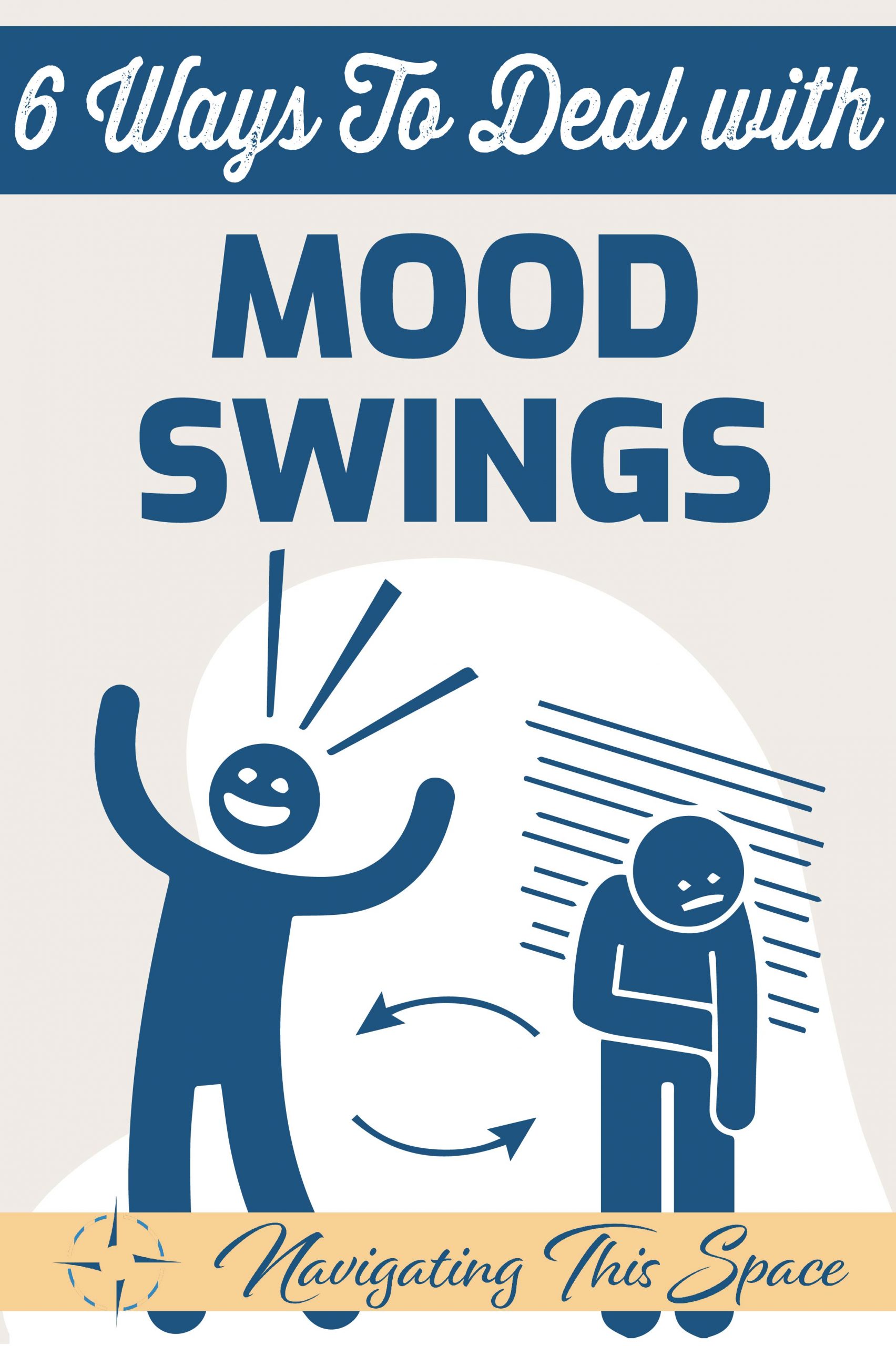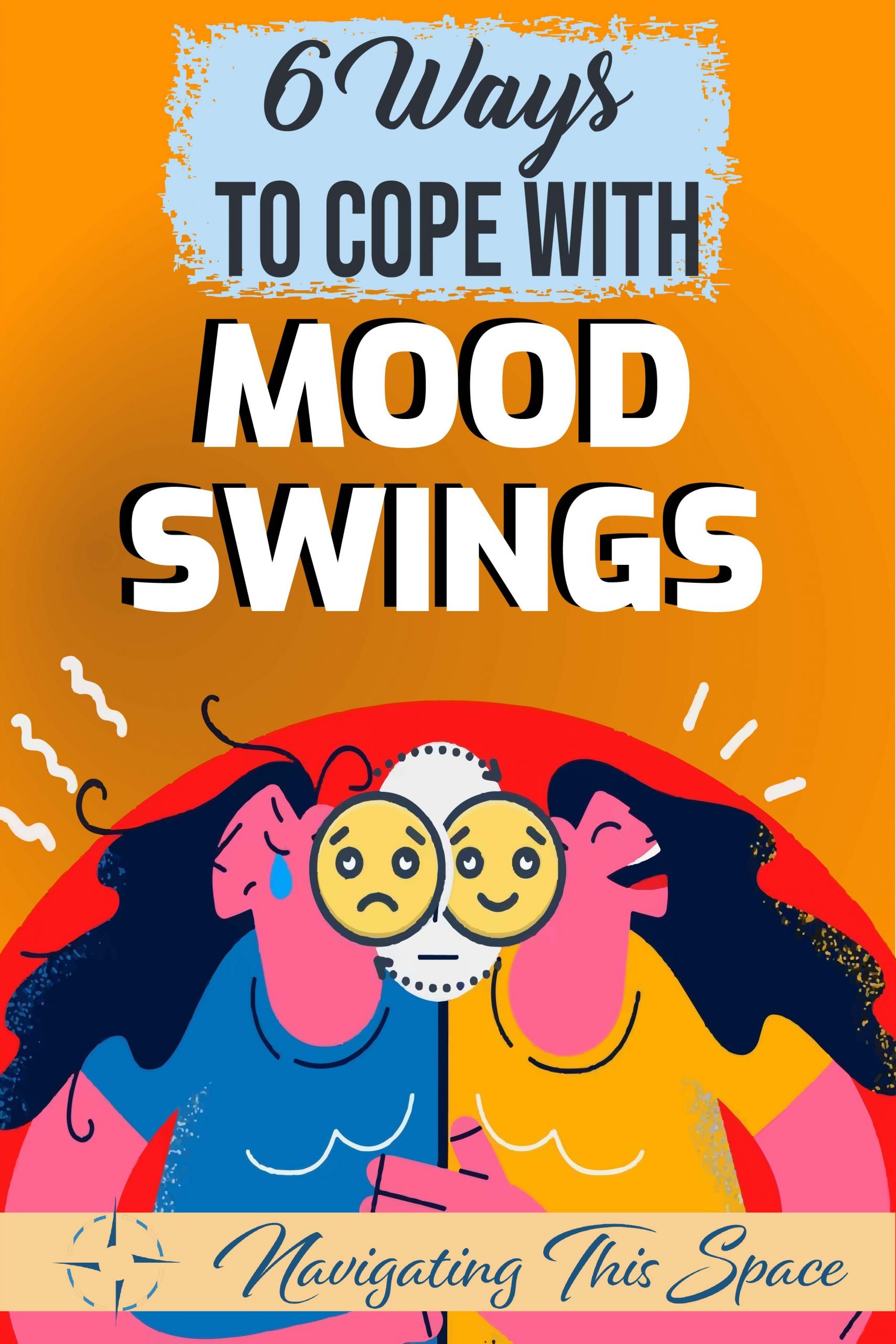Mood swings can be frustrating and confusing, especially if you don’t know how to deal with them. However, there are several simple things you can do to help cope with mood swings.
In this blog post, we’ll discuss six ways to deal with mood swings. But, before we dive in, let’s first understand what mood swings are.
- What Are Mood Swings?
- What Causes Mood Swings?
- How To Deal With Mood Swings?
- Acknowledge Your Mood Swings!
- Questions You May Have
What Are Mood Swings?
Mood swings, also known as emotional shifts or mood disorders, are sudden and extreme changes in emotion.
They can be caused by a variety of things, such as hormones, stress, medications, and underlying medical conditions.
Mood swings are a normal part of life for some people. However, for others, they can be disruptive and may even interfere with daily activities.
For example:
Someone who experiences mood swings may feel fine one minute and then suddenly become angry or sad the next.
Mood swings can also affect how you think and behave. For instance, you could make impulsive decisions or say things you later regret.
While mood swings are a common experience, they can be challenging to deal with.
What Causes Mood Swings?
Mood swings can be caused by a variety of factors, both physical and psychological. According to John Hopkins Medicine, mood swings can be caused by an imbalance of brain chemicals.
These imbalances show up as changes in how you think and feel.
For example:
Hormonal changes for women during puberty, pregnancy, the postpartum period, or menopause can lead to mood swings.
While in men, low testosterone levels can also cause mood swings.
Certain medical conditions, such as thyroid problems, epilepsy, borderline personality disorder, major depressive disorder, or Parkinson’s disease, can cause mood swings.
Other physical causes include:
- Changes in sleep patterns
- Substance abuse
- Withdrawal from drugs or alcohol
- Side effects of certain medications
In addition to physical causes, psychological factors can also contribute to
stress, anxiety, and depression
In some cases, mood swings may be a sign of a more serious underlying condition, such as bipolar disorder.
If you are experiencing frequent or severe mood swings, it is important to speak with a doctor or mental health professional for a proper diagnosis and treatment plan.
How To Deal With Mood Swings?
1. Identify and Understand Your Triggers
The first step to dealing with mood swings is identifying and understanding your triggers. Triggers are anything that drastically changes your mood.
Some common triggers are:
- Hormonal changes
- Stressful events or life transitions
- Lack of sleep
- Poor diet
- Certain medications
- Substance abuse
Once you know what your triggers are, you can start to take steps to avoid them.
For example:
If you know that lack of sleep triggers your mood swings, make sure to do enough throughout the day to get your body tired and ready for bed at night.
2. Practice Relaxation Techniques
Relaxation techniques can help manage stress and anxiety, both triggering mood swings.
Some relaxation techniques that you may want to try are:
- Deep breathing exercises
- Yoga or stretching
- Meditation
- Guided imagery
- Progressive muscle relaxation
They help reduce stress and promote positive thinking, and it can also help you to cope with the symptoms of mood swings when they do occur.
Recommended Article: How To Rejuvenate, Rest And Relax Your Mind, Soul And Body
3. Exercise Regularly
Exercise is a great way to manage stress and improve your overall mood. It can also help to reduce the frequency and severity of mood swings.
Some benefits of exercise include:
- Reducing stress and anxiety
- Improving sleep
- Boosting energy levels
- Increasing endorphins, which are hormones that have mood-boosting effects
If you are not used to exercising, start slow and gradually increase the intensity over time.
This coping mechanism is my favorite as it helps with my mood swings and gives me more energy and helps me clear my heavy thoughts.
For example:
A few days ago, I went to the gym for a swim workout, and even though I was very moody, I forced myself to make my scheduled time.
While standing poolside waiting for an open lane, I started thinking of a million reasons to just walk away and hit the sauna instead.
However, when a lane finally opened up and I finished my warm-up lap, I felt better.
The water and movement gave me a chance to clear my head and focus on something other than whatever it was that had me feeling down
I left the gym feeling refreshed, accomplished, and in a much better mood.
4. Eat a Healthy Diet
What you eat affects your mood.
Food plays a significant part in our health; the healthier we eat the healthier, we feel.
According to the National Institutes of Health (NIH), studies have shown that diet and nutrition can help to prevent depression and also help to make it better.
When you eat healthy foods, your body gets the nutrients and minerals it needs to run properly.
If you are not getting enough of certain nutrients, it can lead to feelings of fatigue, irritability, and even depression.
Some plant-based mood-boosting foods that you may want to include in your diet are:
- Beans and lentils
- Nuts and seeds
- Oats
- Dark chocolate
- Bananas
When you feel like your mood is starting to swing, try to eat something healthy instead of reaching for sugary or processed foods that will add more guilt on top of whatever you are already feeling.
Recommended Article: The Best Herbal Tea For Energy
5. Get Enough Sleep
Sleep is essential for your overall health and well-being.
It helps restore your energy, repair your body, and affect your moods.
Lack of sleep can trigger irritability and anxiety, which can lead to mood swings.
Most adults need 7–8 hours of sleep per night to function at their best. It’s not uncommon that some may need more than eight hours of sleep.
If your work is strenuous or you lift heavy weights at the gym, you may need even more sleep to help your body recover.
Getting enough sleep should be your top priority.
There are a few things you can do to help improve your sleep quality:
- Create a routine by going to bed and waking up at the same time every day.
- Avoid caffeine and alcohol before bedtime
- Create a relaxing environment in your bedroom
- Keep electronics out of the bedroom to minimize distraction. So yes, that means turning off your TV and laptop and silencing your phone.
- Reading before bedtime can also help you relax and fall asleep more easily.
Recommended Article: Top 6 Best Sleep Products to Help You Sleep Better
6. Talk to someone you trust about how you’re feeling
Sometimes just talking to someone about what you’re going through can help to improve your mood while understanding your trigger.
Find someone you trust to confide in about your struggles with mood swings.
This person could be a family member, friend, therapist, or anyone who makes you feel comfortable.
Getting things off your chest can help improve your mood and make you feel better.
It can be a family member, friend, therapist, or anyone you trust and feel comfortable speaking with.
Talking openly and honestly about how you’re feeling can help to relieve some of the stress and anxiety that you may be feeling.
Finally, remember that mood swings are often normal and manageable. Learning to cope with them healthily can make a big difference in your life.
If you’re struggling with mood swings and want to find other ways to cope, please reach out to a professional for help.
There is no shame in seeking assistance from mental health professionals. In fact, it shows strength and courage.
You are not alone in your struggles, so don’t suffer alone.
Acknowledge Your Mood Swings!

Your moods are affected by a variety of things: what you eat, how much sleep you get, your level of stress, and even the weather.
Sometimes, it may seem like there’s nothing you can do to improve your mood but something as simple as watching your favorite Netflix series can help you feel better.
There is always something you can do to improve your mood, including going to sleep when you’re feeling low.
What have you found helpful in coping with your mood swings? Share with us in the comment section below.
Questions You May Have
Is it normal to get mood swings?
Everyone experiences mood swings from time to time, and sometimes they’re nothing to be concerned about. It is normal to experience mood swings, especially during puberty, adolescence, and adulthood.
What does a mood swing feel like?
A mood swing can feel like a roller coaster ride. You may feel happy one minute and then suddenly feel angry, frustrated, or even sad the next.
How do I deal with mood swings?
Start by identifying your triggers. Once you know what sets off your mood swings, you can start to find ways to avoid or deal with them.
Why am I moody for no reason?
It may seem like you’re moody for no reason, but that’s never the case. Something may have triggered your mood swings. It could be as simple as not getting enough sleep or feeling overwhelmed with work or school.
Pin It!






This is just the post I needed to read today, after arguing with my SO over the most ridiculous things. I need to write down what I think my triggers might be and work on them.
Thank you for reading Cindy. I’m glad it resonated with you at this time and I hope that you find the tips helpful as you work to manage your mood swings.
All super valid points!!! I think getting enough sleep and knowing my triggers are the ones that spoke to me. But I really liked the healthy diet as well….it really makes such a big difference. Thanks so much for sharing!!
Thanks for sharing your thoughts with us Nicolle! I’m glad you found some of the tips helpful. It’s so important to be mindful of our moods and take steps to manage them in healthy ways.
My mood swing can last all day! Seriously, there is great information in this post and as a nurse, I can tell you that you hit the nail on the head with this one! Good information in here.
Thank you for reading, Susan. I’m glad to hear that you found the post helpful and that as a nurse, you can affirm the accuracy of the information shared.
All great information — it’s good to be reminded there’s nothing wrong with you if you do experience mood swings — and that there’s a way to deal with them.
Thank you for reading the article, Tami. I’m glad you found it helpful.
My mood plays a big role in my blogging life! Haha! There will be times that I can write many articles but most of the time feeling lazy!
Micheal, I feel you! Mood swings definitely have an impact on my productivity but the key is to work through it. Thanks for reading and commenting.
Very informative read!
I’m happy you found it helpful Alejandra, thanks for reading!
Another trigger that’s common is a deviation from routine. There’s something called the “zeitgeber hypothesis” that says (basically) people with mood disorders are more stable when they get up, eat meals, socialize, etc. at the same times every day, and that when things are disrupted it often triggers mood swings. A “zeitstörer” (disrupter) can be anything from a new job to traveling, especially across time zones. I think it’s pretty interesting!
Thanks for sharing this Sammie, I’m definitely going to look into this more.
These days, mood fluctuations are probably typical, therefore everyone should develop coping mechanisms. Your article will undoubtedly rank at the top for this concept.